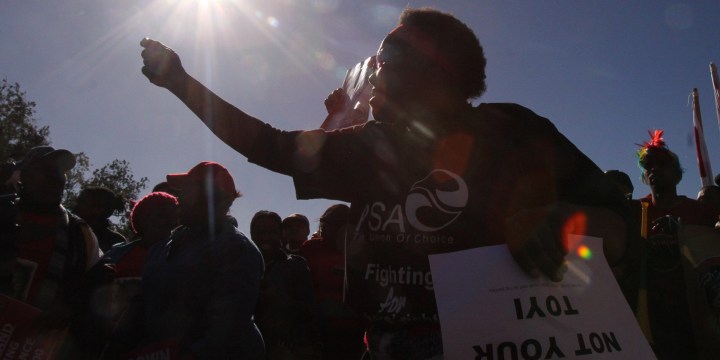FRUITLESS TALKS
Trade unions closer to strike after wage negotiations in public sector stall

Public sector trade unions are starting a ballot process to determine whether their members want to embark on a strike. A major strike in the public sector last occurred in 2010 and paralysed schools and hospitals for 20 days.
Pay rise negotiations in the public sector have not been productive or produced a firm agreement since they started in May and trade unions representing SA’s 1.3 million public servants are increasingly threatening strike action.
The latest negotiations were on Friday, 12 August at the Public Service Coordinating Bargaining Council (PSCBC), where trade unions and government officials usually discuss conditions of employment in the public sector. But both parties could not find each other on wage increases during 2022 for public servants including doctors, nurses, teachers and police officers.
The negotiations have stalled to the extent that public sector trade unions are starting a ballot process to determine whether their members want to embark on a strike. A strike would shut down public amenities such as hospitals, schools and police stations.
Trade unions are still set on a wage increase of 6.5% (reduced from 10%), which the government has rejected, arguing that it is unaffordable and could worsen public finances if implemented.
During the PSCBC negotiations, the government tabled a 1.5% pay hike that is known as “pay progression”, which is ordinarily awarded to public servants for their years of service and is factored in every year. As a sweetener, the government threw in an after-tax cash gratuity (or bonus) for public servants of R1,000 a month.
At the recent PSCBC meeting, the government offered a concession. It proposed increasing the “pay progression” rate from 1.5% to 3%. But there is a caveat to the rate increase. The government would embark on a range of initiatives that would keep the amount it spends to remunerate public servants from growing, including asking public servants to take early retirement without adverse penalties (especially those between the ages of 60 and 64) and reassessing critical skills in the public sector with a view to offering voluntary severance packages.
The government wants to contain the cost of remuneration for public servants because it is currently the single largest component of its expenditure, eating into the budget for service delivery, and pro-economic and investment initiatives. Pencilling in only the 1.5% pay progression and R1,000 a month cash gratuity, the government expects to spend R682.5-billion in 2022/23 to remunerate public servants. The expenditure is set to drop to R675-billion in 2023/24, and then rise to R702-billion in 2024/25.
Rejection
Business Maverick understands that public sector trade unions, including the Public Servants Association (PSA), Police and Prisons Civil Rights Union (Popcru), and others affiliated to labour federation Cosatu have rejected the government’s improved pay progression rate (the 3%).
Trade union officials, including the PSA’s general manager, Reuben Maleka, have argued that increasing the pay progression rate to 3% is not a new offer as it is a benefit that already exists and is included in various frameworks that regulate pay in the public sector. The Occupation Specific Dispensation for the public sector (a pay framework regulated by the PSCBC) already provides for a pay progression of between 1.5% and 3%, said Maleka.
Instead, the trade unions want a wage increase that is either close to or exceeds the consumer inflation rate, which was 7.4% in June. This has created a major setback for the government’s efforts to reach a wage agreement.
Visit Daily Maverick’s home page for more news, analysis and investigations
The PSA, which claims to represent close to 200,000 public servants, said it will now ballot its members about embarking on a strike. A major strike in the public sector last occurred in 2010 and paralysed schools and hospitals for 20 days. The strike turned violent; public servants blocked hospital entrances, striking workers disrupted surgery in operating theatres, nonstriking workers were assaulted, and police fired tear gas, rubber bullets and water cannon at state facilities in Gauteng and Northern Cape.
At the time, trade unions demanded wage increases of 8.6% and a R1,000 monthly housing allowance. To end the strike, trade unions eventually accepted a 7.5% pay rise and an R800 monthly housing allowance.
Trade unions are divided about how to get the government to accede to their demands. For example, Popcru, which claims to represent 150,000 police, correctional and traffic officials, recently resolved at its special national executive committee meeting that it would march to the Union Buildings on 20 September to demand a pay rise of “not less than 10%” and for the government to “reverse all austerity measures” in the public sector.
Meanwhile, trade unions affiliated with Cosatu are still committed to the PSCBC process and set to meet with the government again on Thursday, 18 August. If these talks fail, the unions plan to declare a wage dispute, which would pave the way for a conciliation dispute resolution process to start, the talks of which will be mediated by an independent party. DM/BM
















 Become an Insider
Become an Insider
Let them strike. Maybe service levels will improve if we bring back the old staff as “scab” labour …
Perhaps if they did their jobs, we wouldn’t be in the mess we are. They turn a blind eye to corruption and theft. Retrench 40% of them, keep the best and pay them more. I always see people in government offices chatting, strolling around, eating and looking at their phones- so the same amount of work could get done without these leeches.